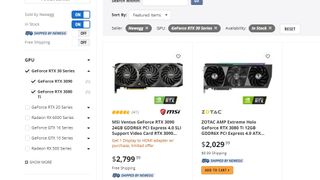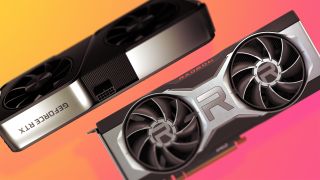Has the crypto crash had any effect on GPU availability?
There are more AMD graphics cards around than Nvidia GPUs, but plentiful stock is still a far away dream.

A sea of red in the cryptocurrency markets might not make for pleasant reading for some, but for gamers, it could be great news. There are early signs that graphics card prices are falling. It's a stretch to say that a couple of post holiday dips constitutes a trend, but any downward moves are something we'll happily take in these troubled times. However, falling prices aren't really relevant if shelves are still bare. So, have price drops had any effect on GPU availability at all?
The rewards given for Ethereum mining are the reason why there's massive GPU demand. But those rewards are worth less given that Eth has fallen by roughly 50% from its November highs. Crypto prices are volatile but a 50% drop for the number two crypto in under three months is drastic.
The inference is that less profitability means fewer miners will invest in new GPU purchases. This is because it takes longer to recoup the cost of a new GPU. Lower demand should translate to more cards on shelves. That's the theory anyway. Is it bearing out? Are there more GPUs in stock?
If we look at cards sold directly by Newegg USA, the answer is a resounding no. Newegg lists around 140 RTX 30 series cards, but if we narrow the search to models that are in stock, we get a whopping two. These two cards are a single 3090 and a single 3080 Ti. They aren’t exactly bargains either at $2800 and $2030.
On the AMD side of the aisle, things are better. Newegg lists 90 RX 6000 cards. If we narrow the search to those in stock only, we get 49 cards. The card with the most models in stock is the RX 6900 XT, while the model with the fewest is the RX 6800.
If we switch over to BestBuy, the situation is similar. It lists around 100 RTX 30 series cards. But if we count the number in stock, guess how many there are? Zero. Zilch. Nada. On the AMD side, BestBuy lists far fewer AMD cards, with around 40 RX 6000 cards listed. Five of which are in stock.

If we switch over to the UK and look at Scan the situation isn’t any better. We count two RTX 30 cards in stock. One 3090 and one 3070 LHR. There’s also a single 3070 Ti listed for preorder with an ETA of the 4th of February. That’s interesting in itself as it would indicate that upcoming shipments are very sporadic and it doesn't bode well for a gamer hoping to snag an Nvidia GPU over the next few weeks.
The biggest gaming news, reviews and hardware deals
Keep up to date with the most important stories and the best deals, as picked by the PC Gamer team.
When looking at stocks of AMD GPUs at Scan, by far the card with the most number of models in stock at Scan is again the expensive RX 6900 XT, with just a handful of other cards in stock. Curiously, there are zero RX 6500 XT cards in stock.
Let's fly down under and see what popular Australian retailer Mwave has in stock. Here the situation is a lot better. It lists no fewer than 67 RTX 30 series cards in stock, with a variety of brands and models available. It's a similar story for RX 6000 cards with a wide variety of cards available, though only two RX 6800s.

How to buy a graphics card: tips on buying a graphics card in the barren silicon landscape that is 2021
So, it looks like the events of the last couple of weeks haven’t had any effect on GPU availability, though in Australia the situation is nowhere near as bad. Nvidia cards are rare as hen's teeth, while AMDs cards, which generally aren't as appealing to miners, are more widely available. Is there something of a lag effect? Will mining demand start to drop off or is the current crypto dip, just a dip? Perhaps Intel will come to the rescue?
Predicting the future is impossible, but If crypto prices continue to fall and mining becomes even less profitable, gamers won’t have to compete with as many miners for what few cards are available. And that's a good thing.

Chris' gaming experiences go back to the mid-nineties when he conned his parents into buying an 'educational PC' that was conveniently overpowered to play Doom and Tie Fighter. He developed a love of extreme overclocking that destroyed his savings despite the cheaper hardware on offer via his job at a PC store. To afford more LN2 he began moonlighting as a reviewer for VR-Zone before jumping the fence to work for MSI Australia. Since then, he's gone back to journalism, enthusiastically reviewing the latest and greatest components for PC & Tech Authority, PC Powerplay and currently Australian Personal Computer magazine and PC Gamer. Chris still puts far too many hours into Borderlands 3, always striving to become a more efficient killer.
Most Popular






